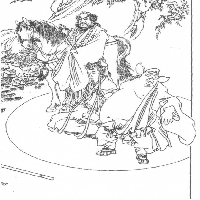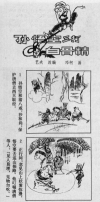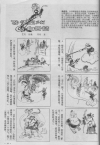
Illustration:
ill. 6.14 a (set: 6.14)
Author:
Zhao Hongben (1915-2000) 赵宏本
Date:
1962
Genre:
comic, comic book, comic strip
Material:
scan, paper, black-and-white; original source: woodblock print
Source:
SWKSDBGJ 1962: Sun Wukong san da baigujing 孙悟空三打白骨精 (Sun Wukong thrice defeats the white-boned demon). Shanghai: Shanghai meishu, 1962:7.
Keywords:
Journey to the West, nudity, navel, nipples, sexuality, lewdness, criticism
Zhao Hongben: Sun Wukong thrice defeats the white-boned Demon 1962 (Zhao Hongben: Sun Wukong san da baigujing 赵宏本: 孙悟空三打白骨精)
Mao himself had, on February 28, 1966, called for “local Sun Wukongs,” i.e., local heroes, to become active. In a conversation with Kang Sheng, Mao had allegedly said: “I have always advocated that whenever the Central organs do something wrong, it is necessary to call upon the local authorities to rebel and attack the Central government. The local areas must produce several more Sun Wukongs to vigorously create a disturbance at the Palace of the King of Heaven.” But instead of being praised, Zhao Hongben’ Monkey comic and its artistic execution is criticized and banned in the early years of the Cultural Revolution; Zhao Hongben, is condemned, struggled, and nicknamed “The Comic Tyrant of the South” (连环画的南霸天 Lianhuanhua de Nan Batian), thus alluding to one of the most vicious bullies from the Cultural Revolution model works, the landlord Nan Batian who appears in the model ballet The Red Detachment of Women.
According to the Red Guards who attacked him, there were three reasons for the criticism: 1) His demon is considered much too beautiful, 2) His hero, Sun Wukong, is not enough of a hero to hold up to Cultural Revolution standards of scrutiny, and 3) the comic contains too much “lewd sexual material”. The latter is obivous here: in the prize-winning edition of 1962 Zhu Bajie appears half-naked, and his nakedness is blatantly obvious as his navel and nipples are showing.


















































































